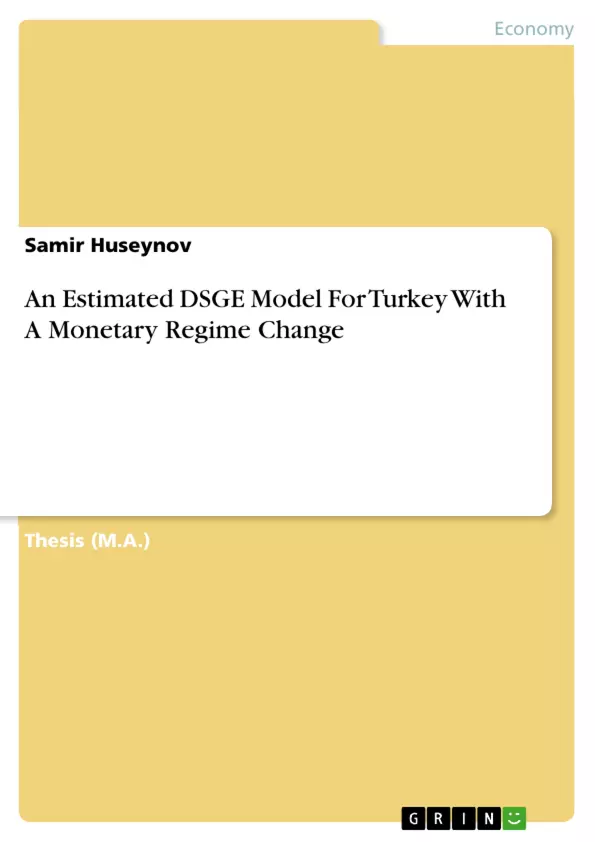Using of developments of the last decade in Bayesian estimation, I estimate a small open economy Dynamic Stochastic General Equ ilibr ium (DSGE) model fo r Turkey. The thesis explicitly accounts for a monetar y regime change fro m an exchange rate targeting to an exp licit inflation targeting with a flexible exchange rate. In both regimes, I investigate the behavior of the monetary authority and the main driving forces of business cycles of key macro economy variables of the Turkish economy. My results can be summarized as follows. Monetary policy focused on the stabilizing of the nominal exchange rate in the exchange rate targeting regime. But, it is mainly concerned with the price stability in the inflation targeting reg ime. Monetary policy shocks were the main sources of the fluctuations under both regimes. However, the foreign output shock in the first regime and the real exchange rate shock in the second regime appeared as the additional sources of the fluctuations in the business cycles. The Central Bank of Tur key managed to neutralize inflatio nary sho cks and achieved stability in output and consumption after the regime change.
Keywords: Turkey, Bayesian estimation, DSGE models, regime change
Inhaltsverzeichnis (Table of Contents)
- Abstract
- List of tables and figures
- 1. Introduction
- 2. Derivation of the baseline model
- 2.1. Households
- 2.2. Inflation, the real exchange rate and terms of trade
- 2.3. International Risk Sharing Condition
- 2.4. Firms
- 2.5 Price setting behavior and incomplete path through
- 2.6. Equilibrium
- 3. The estimation methodology
- 3.1 Specification of the data and prior distribution
- 4. Results
- 4.1 Parameter estimation and posterior distribution
- 4.2. Variance decomposition and Impulse response
- Conclusion
- Reference
- Appendix A
- Appendix B
Zielsetzung und Themenschwerpunkte (Objectives and Key Themes)
This thesis aims to analyze the Turkish economy's response to a monetary regime change, specifically from an exchange rate targeting regime to an inflation targeting regime with a flexible exchange rate. The study investigates the behavior of the monetary authority and the main driving forces of business cycles in key macroeconomic variables within both regimes. The analysis employs Bayesian estimation techniques to estimate a small open economy Dynamic Stochastic General Equilibrium (DSGE) model for Turkey.
- Monetary policy in exchange rate targeting and inflation targeting regimes
- Impact of monetary policy shocks on business cycles
- Impact of foreign shocks on business cycles
- Effectiveness of monetary policy in achieving stability in output and consumption after the regime change
- Application of Bayesian estimation techniques to a DSGE model for Turkey
Zusammenfassung der Kapitel (Chapter Summaries)
- Chapter 1: Introduction: This chapter provides an overview of Turkey's economic history, highlighting the challenges posed by the fixed exchange rate regime and the subsequent transition to an inflation targeting regime. It outlines the motivations behind the regime change and the key policy objectives.
- Chapter 2: Derivation of the baseline model: This chapter presents the theoretical framework of the DSGE model, detailing the equations and assumptions that govern the behavior of households, firms, and the monetary authority within the Turkish economy. The chapter also addresses the key macroeconomic variables, including inflation, the real exchange rate, and terms of trade.
- Chapter 3: The estimation methodology: This chapter outlines the methodology used for estimating the parameters of the DSGE model. The chapter discusses the Bayesian estimation approach, including the specification of the data, prior distributions, and the estimation process.
- Chapter 4: Results: This chapter presents the results of the model estimation and discusses the findings in relation to the impact of monetary policy and foreign shocks on the Turkish economy. The chapter analyzes the variance decomposition and impulse response functions to provide insights into the dynamics of the economy under both exchange rate targeting and inflation targeting regimes.
Schlüsselwörter (Keywords)
This study focuses on the Turkish economy, utilizing Bayesian estimation techniques to analyze a DSGE model. The research explores the impact of a monetary regime change from exchange rate targeting to inflation targeting, examining the behavior of the monetary authority and the key drivers of business cycles within these regimes. The analysis centers around important concepts such as monetary policy shocks, foreign output shocks, and real exchange rate shocks.
Frequently Asked Questions
What is the focus of the DSGE model for Turkey?
The thesis estimates a small open economy DSGE model to analyze Turkey's transition from exchange rate targeting to inflation targeting.
What was the main goal of the monetary regime change in Turkey?
The change aimed to shift focus from stabilizing the nominal exchange rate to achieving long-term price stability through explicit inflation targeting.
How effective was the inflation targeting regime?
Results show that the Central Bank of Turkey managed to neutralize inflationary shocks and achieved greater stability in output and consumption after the change.
What were the main sources of business cycle fluctuations?
Monetary policy shocks were primary sources in both regimes, with foreign output and real exchange rate shocks acting as additional drivers.
What estimation methodology was used in this research?
The study utilizes Bayesian estimation techniques, which have seen significant development in the last decade for macroeconomic modeling.
What are the key variables analyzed in the Turkish economy?
The model focuses on inflation, the real exchange rate, terms of trade, output, and consumption levels.
- Citar trabajo
- Samir Huseynov (Autor), 2010, An Estimated DSGE Model For Turkey With A Monetary Regime Change, Múnich, GRIN Verlag, https://www.grin.com/document/154551



